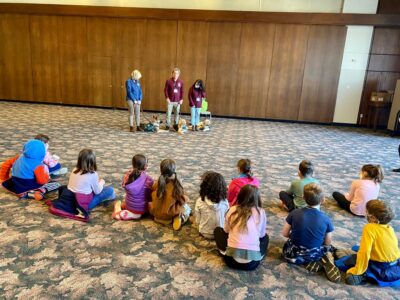

Meet the Lax/Kasler family—Rob, Beth, Samantha, Eric, Max and Sara—who have trained guide puppies since 1998. They volunteer with The Seeing Eye, a philanthropic organization whose mission is to enhance the independence, dignity, and self-confidence of blind people through the use of guide dogs.
What started your family in training guide dogs for the visually impaired?
You might say that we were fated to raise puppies. My wife and I had been considering adding a second dog to our home, but hadn’t made a final decision.
On July 4, 1998, my wife took the kids to the festivities at Memorial Park. She ran into the woman who runs the Essex County club that raises the puppies for The Seeing Eye. The kids had a great time with the puppies she had with her, but I heard nothing about the meeting.
About a week later, they met her and her puppies again at the Turtle Back Zoo. Once again, they had a great time seeing the puppies, but still didn’t tell me.
Another week went by and my wife met her once again in Maplewood Village. I guess the third meeting did the trick. I finally learned about the Essex group and we all went to a training meeting to see if we wanted to participate.
So, put a dog lover (ME) in a room with 30 puppies, and … sign me up! We have been raising puppies ever since.
What is your favorite thing about training guide dogs?
It’s too difficult to pick just one thing.
We love the first day, when a small bundle of fluff is delivered to the house.
We love the day we see the puppy we raised fully trained and working in harness.
We love meeting and speaking to graduates, and learning how life-altering it is for them to be partnered with the dogs we raise.
We love taking the puppies to work, and events, and (when we aren’t experiencing a pandemic) to movies and restaurants. We do this to expose them to all the things their people might encounter, and also to teach the people we meet what purpose these dogs will serve, and how important it is to ignore them and let them do their work.
It really is impossible to pick just one.
You recently brought a guide dog to the Religious School. What did you want the students to understand?
The goal of our visit was to expose the students to service animals and show how important their job is and how critical it is not to distract them from their work. We demonstrated some of the things the dogs learn to do, and how they give blind people independence.
What would you advise to families considering training a guide dog?
Raising a puppy to be a guide for the blind takes a family. Everyone must be on board. One of the most important aspects of raising a puppy is consistency, so everyone is involved. It’s a good things we all enjoy it.
In addition to training guide dogs, what other ways does your family advocate for people with special needs?
Beth is a special needs attorney. She advocates for students who need better educational programs and related services from school districts. She also helps families with estate planning and guardianship, to protect their children with special needs, as well as elderly family members who also need protection.

